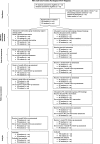Using physical education to promote out-of school physical activity in lower secondary school students - a randomized controlled trial protocol
- PMID: 30727989
- PMCID: PMC6364480
- DOI: 10.1186/s12889-019-6478-x
Using physical education to promote out-of school physical activity in lower secondary school students - a randomized controlled trial protocol
Abstract
Background: Given the documented decline in levels of physical activity in early adolescence, promoting physical activity in young people is a priority for health promotion. School physical education (PE) is an important existing network in which participation in physical activity beyond school can be promoted to the captive young people. The objective of current article is to present the protocol for a PE teacher-delivered theory-based trial to promote secondary school students' participation in physical activity out-of-school contexts. The intervention will be guided by the trans-contextual model explaining the processes by which PE teachers' support for autonomous motivation in the classroom promotes students' motivation to engage in out-of-school physical activity. We hypothesize that school students receiving the teacher-delivered intervention to promote autonomous motivation toward physical activity will exhibit greater participation in physical activities outside of school, relative to students receiving a control intervention.
Methods: The trial will adopt a waitlist-control design with cluster-randomization by school. PE teachers assigned to the intervention condition will receive a two-week, 12-h training program comprising basic information on how to promote out-of-school physical activity and theory-based training on strategies to promote students' autonomous motivation toward physical activity. Teachers assigned to the waitlist control condition will receive an alternative training on how to monitor physical functional capacity in children with special needs. PE teachers (n = 29) from eleven schools will apply the intervention program to students (n = 502) in PE classes for one month. Physical activity participation, the primary outcome variable, and psychological mediators from the trans-contextual model will be measured at pre-trial, post-trial, and at one-, three- and six-months post-trial. We will also assess teachers' autonomy-supportive techniques and behaviours by observation.
Discussion: The study will make a unique contribution to the literature by testing a theory-based intervention delivered by PE teachers to promote school students' participation in out-of-school physical activity. Information will be useful for educators, community stakeholders and policy makers interested in developing programs to promote students' out-of-school physical activity.
Trial registration: ISRCTN39374060 . Registered 19.7.2018.
Keywords: Autonomy support; Behavioural intervention; Intervention development; Self-determination theory; Theory of planned behaviour; Trans-contextual model.
Conflict of interest statement
Ethics approval and consent to participate
The study follows the principles of the Declaration of Helsinki. The study protocol has been approved by the research ethics committee of the University of Jyväskylä (ref no. 2017/12/13). Written informed consent will be sought from participating teachers, students, and students’ parents prior to the commencement of the trial. All participants will be informed that they are allowed to withdraw from the study at any time without prejudice, and have their data deleted. During the study, all travel and activities of research staff and participating teachers will be covered by accident insurance. In case of important protocol changes, a new ethical statement will be requested and new informed consent procedures will be delivered to participants.
Consent for publication
Not applicable.
Competing interests
The authors declare that they have no competing interests.
Publisher’s Note
Springer Nature remains neutral with regard to jurisdictional claims in published maps and institutional affiliations.
Figures
References
-
- Kokko S, Mehtälä A, editors. The Physical Activity Behaviours of Children and Adolescents in Finland - Results of the LIITU study. 2016. p. 4.
-
- Physical Activity Guidelines Advisory Committee. Physical activity guidelines advisory committee scientific report. Washington, DC: US Department of Health and Human Services; 2018. https://health.gov/paguidelines/second-edition/report/pdf/PAG_Advisory_C.... Accessed 30 Jan 2019
-
- van Beurden E, Barnett LM, Zask A, Dietrich UC, Brooks LO, Beard J. Can we skill and activate children through primary school physical education lessons? “Move it groove it” - a collaborative health promotion intervention. Prev Med. 2003. 10.1016/S0091-7435(02)00044-0. - PubMed
Publication types
MeSH terms
Grants and funding
LinkOut - more resources
Full Text Sources
Medical
Molecular Biology Databases




